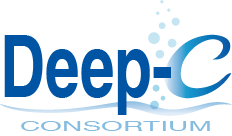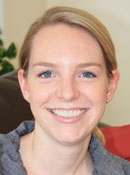Gulf Oil Observers (GOO)
A citizen scientist initiative involving high school students, teachers, and other volunteers in the collection of data along the shores of the Gulf of Mexico
 |
| WHOI's Dr. Chris Reddy (bottom right) gave WFHSAT students inside information on what it takes to be a scientist. Classroom visits by "real" scientists, along with specially designed lesson plans and coastal expeditions geared toward understanding ocean science and oil spill research, are part of the PROJECT GOO curriculum. |
Even though the Deepwater Horizon oil spill occurred more than three years ago, the process of gathering and analyzing information about the fate of the spilled oil carries on. Deep-C researchers continue to work in the areas affected by the disaster, studying the long-term fate and effects of petroleum hydrocarbons in the Gulf. In 2013, the Deep-C Consortium implemented a citizen science initiative to connect high school students, teachers and other volunteers with leading scientists in this cutting edge research.
The Gulf Oil Observers (GOO) project is an education and outreach effort that trains students and others how to be effective citizen scientists, and then put their new-found knowledge into use, in the lab and during visits to Gulf beaches.
GOO mentors are educators and scientists associated with the Deep-C research project -- a long-term study investigating the environmental consequences of petroleum hydrocarbon release in the deep Gulf on living marine resources and ecosystem health. Classroom visits, in conjunction with specially designed lesson plans and coastal expeditions geared toward understanding ocean science and oil spill research, are part of the Project GOO curriculum.
The first team of GOO "scientists in training" are a group of students at the West Florida High School of Advanced Technology (WFHSAT) in Pensacola, one of two schools selected to participate in the GOO project during the 2013-14 school year. Since Fall 2013, their classroom has been visited by guest lecturers from the Deep-C community, learning first-hand about the research being conducted in the Gulf of the Mexico. Their GOO mentors have led them through a host of hands-on activities and experiments designed to, among other things, help them "think like a scientist."
The West Florida High School students will take a coastal field trip in February 2014 (teaming up with scientists from the Woods Hole Oceanographic Institution) where they will look for and collect oil patty samples along the shores of the Gulf of Mexico. Any samples collected by this team of well-trained "GOO-ies" will be shipped to the Woods Hole Oceanographic Institution (WHOI) for analysis. WHOI scientists will be able to identify the source of the oil (for instance, does it contain oil from the 2010 Deepwater Horizon oil spill?) and use the students' samples in ongoing oil spill research.
What the Oil Samples Can Tell Us
|
|
Understanding what happens to oil discharged in the oceans helps scientists anticipate what crude oil will do when it is spilled and where it will go. And scientists from Woods Hole Oceanographic Institution use a novel fingerprinting technique to identify the source of oil found in patties that are still being collected on the beaches near the site of the Deepwater Horizon disaster.
Tracking oil from a spill like the Deepwater Horizon oil spill over a long period of time helps researchers determine a “mass balance.” We can then account for how much of the oil broke down and where the remaining material still resides. Lastly, if we study the long-term fate of oil, we identify areas where it has the greatest likelihood to last, which in turn, can be used in the next spill when setting priorities on what to “protect” or what to clean-up first.
One of the ways the fate of the oil can be determined is to study an effect called weathering — that is, how oil that is discharged into the environment changes over time. Weathering affects the properties of spilled oil. In part, Dr. Chris Reddy's research provides insights into the natural weathering of oil.
"All chemicals have a different personality towards biodegradation, photochemical breakdown, etc., "Reddy explains. So Reddy is interested in knowing which chemicals are the most susceptible to each weathering processes.
Deep-C will host a teacher workshop in June 2014 for educators with an interest in oil spill research and possible participation in Project GOO. So stay tuned for details... and in the meantime check out the Project GOO Blog for updates by our current GOO-ies.
Meet our 2013-14 GOO Mentors
|
|
|
|
 Shawn Walker is a science teacher at the West Florida High School of Advanced Technology in Pensacola and the leader of our first PROJECT GOO student team. Mr. Walker has 30 years of experience as a high school teacher and is a citizen science enthusiast. He is currently participating in a mole crab study in addition to Project GOO with his marine science honors classes. Shawn Walker is a science teacher at the West Florida High School of Advanced Technology in Pensacola and the leader of our first PROJECT GOO student team. Mr. Walker has 30 years of experience as a high school teacher and is a citizen science enthusiast. He is currently participating in a mole crab study in addition to Project GOO with his marine science honors classes. |
 Chris Reddy is a senior scientist in Woods Hole Oceanographic Institution's (WHOI) Department of marine chemistry and geochemistry. Since April 2010, he has devoted most of his research efforts to studying the Deepwater Horizon oil spill in the Gulf. WHOI is a Deep-C partner institution. The Institution is a private, independent, non-profit organization in Falmouth, Mass., dedicated to marine research, engineering, and higher education. Chris Reddy is a senior scientist in Woods Hole Oceanographic Institution's (WHOI) Department of marine chemistry and geochemistry. Since April 2010, he has devoted most of his research efforts to studying the Deepwater Horizon oil spill in the Gulf. WHOI is a Deep-C partner institution. The Institution is a private, independent, non-profit organization in Falmouth, Mass., dedicated to marine research, engineering, and higher education. |
|
|
|
 |
Deep-C was a four-year, interdisciplinary study of deep sea to coast connectivity in the northeastern Gulf of Mexico.Deep-C is no longer an active research project. The information on this website is for historical reference purposes only.
Home | About Us | Research Areas | Data Center | News & Multimedia | Education & Outreach
© Deep-C Consortium. All Rights Reserved.
This research was made possible by a grant fromThe Gulf of Mexico Research Initiative (GoMRI).
Copyright | Disclaimer | Privacy Policy


 Danielle Groenen is a member of Deep-C's education and outreach team and coordinator of PROJECT GOO. Her background includes working in climate change outreach at the University of California, Davis and three years experience as a high school physics teacher in Tampa, FL. She recently began pursuing a PhD in Meteorology from the Florida State University.
Danielle Groenen is a member of Deep-C's education and outreach team and coordinator of PROJECT GOO. Her background includes working in climate change outreach at the University of California, Davis and three years experience as a high school physics teacher in Tampa, FL. She recently began pursuing a PhD in Meteorology from the Florida State University. 
